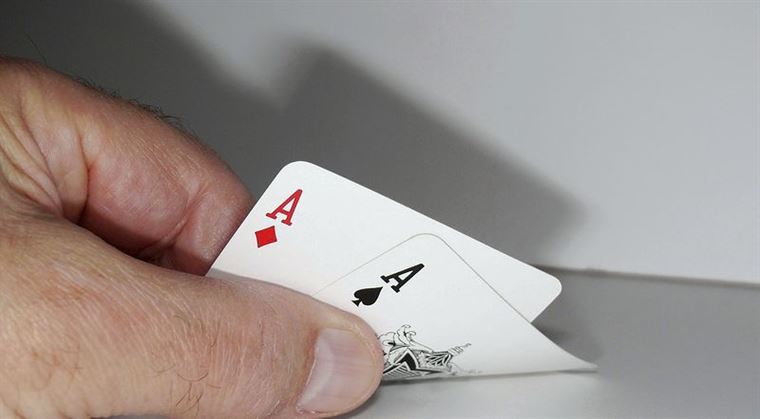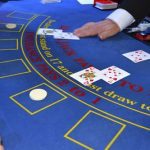
Introduction:
Mindfulness, a practice rooted in ancient Buddhist traditions, has gained significant attention in recent years for its numerous benefits in various aspects of life. One area where mindfulness can be particularly advantageous is in the game of poker. By cultivating a state of present moment awareness and non-judgmental observation, players can enhance their decision-making skills, emotional control, and overall performance at the poker table. In this article, we will explore the advantages of incorporating mindfulness into poker gameplay and provide practical tips on how to incorporate this practice into your own poker strategy.
The Impact of Mindfulness on Poker Decision-Making
Poker is a game that requires not only skill and strategy but also the ability to make quick and calculated decisions. In order to be successful at poker, players must be able to analyze the situation at hand, assess their opponents’ moves, and ultimately make the best decision possible. One tool that can greatly enhance a player’s decision-making abilities in poker is mindfulness.
Mindfulness is the practice of being fully present and aware of one’s thoughts, feelings, and surroundings. It involves focusing on the present moment without judgment or attachment to any particular outcome. When applied to poker, mindfulness can have a profound impact on a player’s decision-making process.
One advantage of practicing mindfulness in poker is that it helps players stay focused and avoid distractions. In a fast-paced game like poker, it’s easy to get caught up in the excitement or become distracted by external factors. By cultivating mindfulness, players are better able to tune out these distractions and remain fully engaged in the game.
Furthermore, mindfulness allows players to maintain a clear and unbiased perspective. Emotions such as anger, frustration, or even overconfidence can cloud judgment and lead to poor decision-making. By practicing mindfulness, players can recognize and acknowledge these emotions without allowing them to dictate their actions. This self-awareness enables players to make more rational and strategic choices.
Another advantage of mindfulness in poker is its ability to improve concentration and focus. Poker requires intense mental effort, and even the slightest lapse in concentration can result in costly mistakes. Mindfulness training strengthens the mind’s ability to sustain attention, allowing players to stay focused for longer periods of time. This heightened concentration can give players an edge over their opponents by enabling them to pick up on subtle tells or patterns in their opponents’ behavior.
So how can players incorporate mindfulness into their poker routine? Here are a few practical tips:
Firstly, take a few moments before each session to center yourself and set your intentions. Close your eyes, take a deep breath, and mentally prepare yourself for the game ahead. This simple act of grounding can help you enter a state of mindfulness from the start.
Secondly, practice observing your thoughts and emotions without judgment during the game. When a negative thought or emotion arises, acknowledge it but don’t let it control your actions. Instead, refocus your attention on the present moment and the task at hand.
Additionally, make an effort to stay fully engaged in the game by avoiding distractions. Put away your phone, turn off the TV, and create a quiet and focused environment. By eliminating external distractions, you can better cultivate mindfulness and improve your decision-making abilities.
Lastly, consider incorporating meditation into your poker routine. Just a few minutes of meditation each day can help train your mind to be more present and aware. There are many guided meditation apps available that can assist you in developing this valuable skill.
In conclusion, mindfulness is a powerful tool that can greatly enhance a player’s decision-making abilities in poker. By staying focused, maintaining a clear perspective, and improving concentration, players can make more strategic choices and increase their chances of success. Incorporating mindfulness into one’s poker routine through techniques such as setting intentions, observing thoughts without judgment, avoiding distractions, and practicing meditation can lead to significant improvements in gameplay. So why not give it a try? Your poker skills might just reach new heights with the power of mindfulness on your side.
Enhancing Focus and Concentration through Mindfulness in Poker
Poker is a game of skill, strategy, and mental fortitude. To succeed in this challenging game, players must possess a high level of focus and concentration. This is where mindfulness comes into play. Mindfulness, the practice of being fully present and aware of one’s thoughts and feelings, can greatly enhance a player’s ability to stay focused and make better decisions at the poker table.
One of the advantages of incorporating mindfulness into poker is its ability to improve concentration. In a fast-paced game like poker, it is easy for the mind to wander and lose track of what is happening. By practicing mindfulness, players can train their minds to stay in the present moment, avoiding distractions and maintaining a laser-like focus on the game. This heightened concentration allows players to pick up on subtle cues from their opponents, analyze the ever-changing dynamics of the table, and make more informed decisions.
Another advantage of mindfulness in poker is its ability to reduce tilt, which refers to the emotional frustration and anger that can arise from bad beats or unfavorable outcomes. Tilt can cloud judgment and lead to impulsive decisions based on emotions rather than logic. By practicing mindfulness, players can become more aware of their emotions and learn to detach themselves from negative outcomes. This self-awareness helps them maintain composure and make rational decisions even in the face of adversity.
Practicing mindfulness in poker also improves decision-making skills. When players are fully present and aware of their thoughts and feelings, they are less likely to make impulsive decisions or fall into common cognitive biases. Mindfulness allows players to step back and objectively evaluate each situation, considering all available information before making a move. This thoughtful approach leads to better decision-making, increasing the chances of long-term success in poker.
So how can one incorporate mindfulness into their poker practice? Here are some practical tips:
1. Start with meditation: Begin each poker session with a short meditation to calm the mind and set a positive intention for the game. Focus on your breath, letting go of any distractions or worries.
2. Stay present: During the game, make a conscious effort to stay in the present moment. Avoid getting lost in past hands or worrying about future outcomes. Keep your attention on the current hand and the information available to you.
3. Notice your emotions: Pay attention to any emotional reactions that arise during the game. If you feel frustration or anger, acknowledge it without judgment and let it go. Remind yourself that emotions can cloud judgment and lead to poor decision-making.
4. Take breaks: Mindfulness also involves taking care of oneself. Take regular breaks during long poker sessions to stretch, hydrate, and clear your mind. Use these breaks as an opportunity to reset and refocus.
5. Practice self-compassion: Remember that no one is perfect, and mistakes will happen. Be kind to yourself when things don’t go according to plan. Learn from your experiences and use them as opportunities for growth.
In conclusion, incorporating mindfulness into poker practice can greatly enhance focus, concentration, and decision-making skills. By staying fully present and aware of one’s thoughts and emotions, players can navigate the complexities of the game with composure and clarity. So take a deep breath, clear your mind, and let mindfulness guide you to success at the poker table.
Developing Emotional Resilience in Poker through Mindfulness

Poker is a game that requires not only skill and strategy but also emotional resilience. The ability to stay calm, focused, and in control of one’s emotions can make all the difference between winning and losing. This is where mindfulness comes into play. Mindfulness, a practice rooted in ancient Buddhist teachings, has gained popularity in recent years as a powerful tool for managing stress and improving overall well-being. In the context of poker, it can help players develop emotional resilience and enhance their decision-making abilities.
So, what exactly is mindfulness? At its core, mindfulness is about being fully present in the moment and non-judgmentally aware of one’s thoughts, feelings, and bodily sensations. It involves paying attention to the present moment without getting caught up in past regrets or future worries. In the fast-paced world of poker, where split-second decisions can determine the outcome of a hand, cultivating mindfulness can be invaluable.
One of the main advantages of practicing mindfulness in poker is its ability to help players manage their emotions effectively. Poker can be an emotionally charged game, with highs and lows that can trigger strong reactions. By developing mindfulness skills, players can learn to observe their emotions without becoming overwhelmed by them. They can acknowledge their anger, frustration, or excitement without letting these emotions cloud their judgment. This emotional awareness allows players to make more rational decisions based on the actual cards and probabilities rather than being driven solely by their emotional state.
Another benefit of mindfulness in poker is its impact on focus and concentration. In a game that requires constant attention and mental agility, distractions can be detrimental. Thoughts about previous hands or concerns about future outcomes can easily disrupt a player’s concentration. However, through mindfulness practices such as meditation or breath awareness, players can train their minds to let go of distractions and bring their focus back to the present moment. This heightened focus enables players to pick up on subtle cues from opponents, make better reads, and ultimately make more informed decisions.
Practicing mindfulness in poker is not limited to the time spent at the table. It can also be incorporated into everyday life, which can have a profound impact on a player’s overall well-being and resilience. Mindfulness teaches individuals to approach challenges with an open mind and non-reactive attitude. This mindset can help players navigate the inevitable ups and downs of poker without getting discouraged or overly attached to results. By accepting both wins and losses as part of the game, players can maintain a balanced perspective and avoid tilting, a state of emotional turmoil that often leads to poor decision-making.
So how can one develop mindfulness skills in the context of poker? One practical tip is to start with short meditation sessions before and after playing. Taking just a few minutes to sit quietly, focus on the breath, and observe any thoughts or emotions that arise can set the stage for a more mindful experience at the table. Additionally, incorporating mindfulness techniques into daily activities such as eating or walking can help reinforce the practice and make it a natural part of one’s routine.
In conclusion, developing emotional resilience in poker through mindfulness is a powerful tool that can enhance a player’s performance and overall well-being. By managing emotions effectively, maintaining focus, and cultivating a non-reactive mindset, players can make better decisions and navigate the highs and lows of the game with grace. So why not give mindfulness a try? Your poker game might just reach new heights.
Using Mindfulness Techniques to Manage Tilt and Variance in Poker
Poker is a game that requires not only skill and strategy but also mental fortitude. It can be a rollercoaster of emotions, with players experiencing both highs and lows throughout their sessions. One moment you might find yourself on top of the world, raking in chips left and right, and the next you could be facing a devastating loss. This unpredictability can often lead to frustration and tilt, which can negatively impact your decision-making abilities.
This is where mindfulness comes into play. Mindfulness is the practice of being fully present and aware of your thoughts, feelings, and bodily sensations in the present moment, without judgment. By incorporating mindfulness techniques into your poker game, you can better manage tilt and variance, ultimately improving your overall performance at the table.
One of the key advantages of practicing mindfulness in poker is its ability to help you recognize and control tilt. Tilt is a state of emotional distress that occurs when a player becomes frustrated or angry due to a series of bad beats or unfavorable outcomes. It can cloud your judgment and lead to impulsive decisions that are not based on sound strategy.
By cultivating mindfulness, you can become more attuned to your emotions and learn to identify the early signs of tilt. Instead of reacting impulsively, you can take a step back, acknowledge your emotions, and make a conscious effort to regain control. This might involve taking a short break from the game, deep breathing exercises, or simply refocusing your attention on the present moment.
Another advantage of mindfulness in poker is its ability to help you navigate through variance. Variance refers to the natural ups and downs that occur in poker due to luck and probability. Even the best players in the world experience losing streaks, and it’s essential to maintain composure during these challenging times.
Practicing mindfulness allows you to develop resilience and acceptance towards variance. Rather than dwelling on past losses or becoming overly attached to short-term results, you can stay grounded in the present moment and focus on making the best decisions possible. This mindset shift can help you maintain a long-term perspective, which is crucial for success in poker.
So how can you incorporate mindfulness into your poker game? One practical tip is to start by setting aside dedicated time for mindfulness practice outside of the poker table. This could involve meditation, deep breathing exercises, or engaging in activities that promote relaxation and self-awareness. By regularly practicing mindfulness off the felt, you’ll develop the skills necessary to apply it during your poker sessions.
During your actual gameplay, it’s important to be fully present and attentive. Avoid distractions and immerse yourself in the game. Pay close attention to your thoughts and emotions without judgment, and when you notice signs of tilt or frustration arising, take a moment to refocus and regain control.
In conclusion, incorporating mindfulness techniques into your poker game can have significant benefits in managing tilt and variance. By cultivating self-awareness and staying present in the moment, you can make better decisions, maintain composure during challenging times, and ultimately improve your overall performance at the table. So why not give it a try? Your poker game might just reach new heights with the power of mindfulness.
Incorporating Mindfulness into Poker Practice for Improved Performance
Incorporating Mindfulness into Poker Practice for Improved Performance
Poker, a game of strategy and skill, requires players to make quick decisions based on limited information. It’s a mental battle that can be both exhilarating and challenging. To succeed in poker, players need to have a clear mind, focus, and the ability to stay calm under pressure. This is where mindfulness comes in.
Mindfulness, often associated with meditation and relaxation, has gained popularity in recent years for its numerous benefits. It involves being fully present in the moment and aware of one’s thoughts, feelings, and surroundings. When applied to poker, mindfulness can enhance a player’s performance by improving their decision-making skills and emotional control.
One advantage of incorporating mindfulness into poker practice is increased self-awareness. By being mindful, players become more attuned to their own thought processes and emotions during a game. They are better able to recognize when they are becoming tilted or emotionally reactive, allowing them to take steps to regain composure and make rational decisions.
Furthermore, mindfulness helps players develop a non-judgmental attitude towards their thoughts and emotions. In poker, it’s common for players to experience frustration or disappointment after a bad hand or losing streak. However, dwelling on negative emotions can cloud judgment and lead to poor decision-making. By practicing mindfulness, players can observe these negative emotions without getting caught up in them, enabling them to maintain focus and make better choices.
Another benefit of incorporating mindfulness into poker practice is improved concentration. In a fast-paced game like poker, distractions are abundant. Whether it’s the noise of chips shuffling, other players’ actions, or external thoughts, maintaining focus can be challenging. Mindfulness teaches players how to bring their attention back to the present moment whenever it wanders off. This heightened concentration allows players to analyze the game more effectively, identify patterns, and anticipate opponents’ moves.
Moreover, mindfulness can help players develop patience, a crucial trait in poker. Patience is essential because not every hand will be a winner, and it’s important to wait for the right opportunity to make a move. By being present and patient, players can resist impulsive decisions and avoid unnecessary risks.
Practical tips for incorporating mindfulness into poker practice include setting aside dedicated time for meditation or breathing exercises before playing. This helps calm the mind and increase focus. Additionally, taking short breaks during gameplay to engage in mindful activities, such as deep breathing or stretching, can help reset the mind and maintain concentration.
It’s also beneficial to cultivate an attitude of curiosity and openness during poker sessions. Instead of fixating on winning or losing, approach each hand with a sense of exploration and learning. This mindset allows players to detach from outcomes and focus on the process, leading to better decision-making and reduced emotional reactivity.
In conclusion, incorporating mindfulness into poker practice offers numerous advantages for players seeking improved performance. By increasing self-awareness, developing emotional control, enhancing concentration, and fostering patience, mindfulness can elevate a player’s game to new heights. Through simple practices like meditation, breathing exercises, and maintaining a curious mindset, poker players can tap into the power of mindfulness and unlock their full potential at the poker table. So why not give it a try? Your mind and your poker game will thank you.In conclusion, mindfulness plays a crucial role in poker by offering several advantages to players. It helps in enhancing focus and concentration, managing emotions effectively, making better decisions, and improving overall mental well-being. By practicing mindfulness techniques such as meditation, deep breathing, and self-awareness exercises, poker players can improve their game and achieve greater success at the tables. Incorporating mindfulness into poker strategies can lead to improved performance and a more enjoyable playing experience.
 Skip to content
Skip to content





